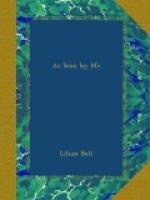Such a beautiful city as this is! Whitelaw Reid has declared Kiev to be one of the four picturesque cities in Europe; certainly it lies in a heavenly place, all up and down hills, with such vistas down the streets to where a mosque raises its gilded dome, or where an historic bronze statue stands out against the horizon. If Kiev had been planned by the French, it could not be more utterly beautiful. The domes of the cathedrals are blue, studded with gold stars; or else pale green or all gold, and the most exquisite churches in all Russia are in Kiev. A terrible monastery, where you take candles and go down into the bowels of the earth to see where monks martyred themselves, is here; and poor simple-minded pilgrims walk many hundred miles to kiss these tombs. Their devotion is pathetic. We had to walk in a procession of them, and I know that each of them had his own particular disease and his own special brand of dirt. The beggars surrounding the gate of this monastery are too awful to mention, yet it is reputed to be the richest monastery in all Russia.
In Kiev we heard “Hamlet” in Russian, and the man who played Hamlet was wonderfully good, surprisingly good. You don’t know how strange it sounded to hear “To be or not to be” in Russian! The acting was so familiar, the words so strange. The audience went crazy over him, as Russian audiences always do. We watched him come out and bow thirty-nine times, and when we came away the noise was still deafening.
They make a sort of candy in Kiev which goes far and away above any sweets I ever have seen. It is a sort of candied rose. The whole rose is there. It is a solid soft pink mass, and it tastes just as a tea-rose smells. It is simply celestial.
We dearly love Kiev, it is so hauntingly beautiful. You can’t forget it. Your mind keeps returning to it, but it is the sort of beauty that you can’t describe satisfactorily. It is like your mother’s face. You can see the beauty for yourself, but no one else can see it as you do, for the love which is behind it.
In Odessa we began to leave Russia behind us. Odessa is all sorts of a place. It is commercial, and not beautiful, but, as usual, our Russian friends made us forget the town and its sights, and remember only their sweet hospitality and friendliness.
We wished to catch the Russian steamer for Constantinople, but we were told that the police would not permit us to leave on such short notice. We felt that this was hard, for we had tried so consistently to be good in Russia that I was determined to go if possible. So I took an interpreter and drove to the police headquarters myself. To my amazement and delight my man told me that it could all be arranged by the payment of a few rubles. But that “few rubles” mounted up into many before I got my passports duly vised. I discovered that our American police are not so very different from Russian police after all, even if they are Irish!




